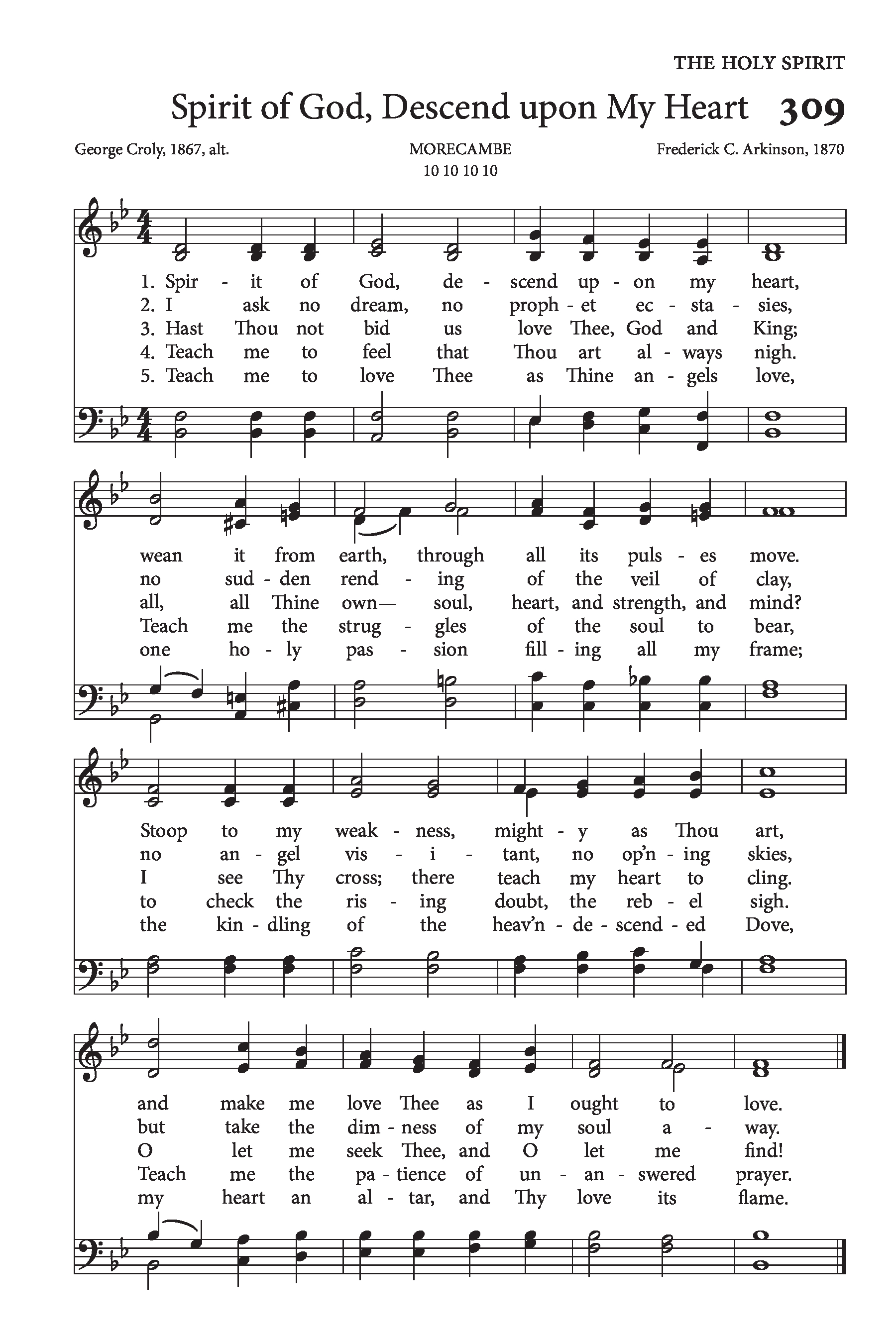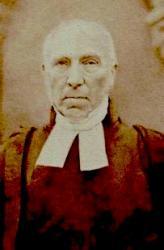Spirit of God, Descend upon My Heart
By George Croly
Lyrics
wean it from sin, through all its pulses move.
Stoop to my weakness, mighty as you are,
and make me love you as I ought to love.
no sudden rending of the veil of clay,
no angel visitant, no opening skies;
but take the dimness of my soul away.
love you with all our heart and strength and mind?
I see the cross— there teach my heart to cling.
O let me seek you and O let me find!
teach me the struggles of the soul to bear,
to check the rising doubt, the rebel sigh;
teach me the patience of unceasing prayer.
one holy passion filling all my frame:
the fullness of the heaven-descended Dove;
my heart an altar, and your love the flame.
Bible Reference
Ephesians 4:29-30
About This Hymn
Author – George Croly, 1780–1860
Composer – Frederick C. Atkinson, 1841–1897
Tune Name – Morecambe
Meter – 10.10.10.10
Scripture Reference – Ephesians 4:29–30
"Let no corrupt communication proceed out of your mouth, but that which is good to the use of edifying, that it may minister grace unto the hearers. And grieve not the holy Spirit of God, whereby ye are sealed unto the day of redemption." (Ephesians 4:29–30, KJV)
While Easter and Christmas are widely observed across the Christian world, two other significant days on the Church calendar often receive less attention in evangelical circles: Ascension Day, celebrated forty days after Easter, and Pentecost Sunday, observed ten days after the Ascension. These events hold deep theological importance. At Christmas, we celebrate the incarnation of Christ; at Easter, His triumph over sin and death. Yet, without His ascension—where He now intercedes for believers and without the coming of the Holy Spirit at Pentecost to indwell and empower the Church, our experience of redemption would be incomplete. In light of Pentecost, few hymns express the longing for spiritual indwelling as powerfully as “Spirit of God, Descend Upon My Heart.”
This deeply devotional text was written by Rev. George Croly, an Irish-born Anglican minister and noted literary figure. Born in Dublin in 1780, Croly graduated from Trinity College and relocated to London around 1810, where he began serving in parish ministry. Alongside his clerical duties, he was active as a poet, novelist, and author of historical and scriptural writings. In 1835, Croly was appointed to reopen St. Stephen’s Church in London, a parish located in one of the city's most neglected and impoverished areas. Under his dynamic and uncompromising preaching, the once-deserted church soon drew large crowds. Croly was known for his theological conservatism and was described as a "fundamentalist in theology, a fierce conservative in politics, and intensely opposed to all forms of liberalism." Despite his strong convictions, his writing—especially this hymn—reveals a tender and deeply introspective spiritual longing.
At the age of seventy-four, in 1854, Croly compiled a hymnal for his congregation titled Psalms and Hymns for Public Worship. Among his original contributions to that volume was this hymn, originally titled “Holiness Desired.” It remains the only widely known surviving hymn from that collection. Though personal in tone, the hymn resonates with believers across generations, offering a heartfelt prayer for the inward presence of the Holy Spirit. Each stanza presents a specific spiritual desire: the first is a call to turn from earthly distractions and pursue divine love above all else; the second expresses a longing for total consecration—of heart, soul, strength, and mind—to God; the third pleads for the patience and peace that come from the Spirit’s abiding presence, especially during seasons of silence and struggle; and the fourth concludes with a striking metaphor—“my heart an altar, and Thy love the flame”a line often praised as one of the most beautiful poetic images in all of English hymnody.
The tune “Morecambe” was composed in 1870 by Frederick C. Atkinson, a gifted English church organist. Though it was initially written for Henry Lyte’s “Abide with Me,” it found a more lasting home with Croly’s text. The tune is named after the town of Morecambe in northern England, a place known at the time for its periodic music festivals. The simplicity and reflective nature of the melody suit the contemplative prayerfulness of the hymn, allowing its message to be sung with sincerity and quiet reverence.
“Spirit of God, Descend Upon My Heart” remains a cherished part of Christian worship, especially during Pentecost observances. It captures the personal cry of the believer seeking not just the gifts of the Spirit, but the very presence of God to fill, purify, and guide the heart. Its legacy endures as a humble and poetic expression of sanctification, transformation, and divine communion.


📬 Subscribe to Our Devotional Updates
Receive weekly hymns, devotionals, and website features directly in your inbox.
Hymn Information

- Category: Hymn
- Author/Writer: George Croly (1854)
- Added: July 8, 2025
- Last Updated: July 8, 2025
- Views: 821
MIDI File
Recent Blog Posts
-
 How to Develop a Consistent Prayer Schedule
How to Develop a Consistent Prayer Schedule
Dec 11, 2025 -
 How to Forgive Someone Who Deeply Hurt You
How to Forgive Someone Who Deeply Hurt You
Dec 11, 2025 -

-
 Why Christmas Is Celebrated on December 25
Why Christmas Is Celebrated on December 25
Dec 11, 2025 -
 10 Most Renowned Hymn Writers
10 Most Renowned Hymn Writers
Dec 10, 2025
Visit Us on Social Media
Latest from X (Twitter)
Tweets by HymnalLibraryLatest from Facebook
Latest on YouTube
Daily Bible Verse
Disclaimer
The hymns, sheet music, MIDI files, and related content on this website are provided for educational and research purposes only.
- Public Domain: Many of the hymns featured here are in the public domain and may be freely used.
- Copyrighted Works: Some hymns may still be under copyright protection. Where applicable, permission has either been requested from the copyright owner, or the content is shared under the principles of fair use for educational purposes.
⚠️ Important Notice: If you wish to reproduce, distribute, or use any copyrighted hymn beyond personal study or educational use, you must obtain permission directly from the copyright holder. This website does not grant any rights for commercial use yet.
If there is any other question please address it to us in our Contact Page, for further assistance. Thank you for using the site. May God Bless You.